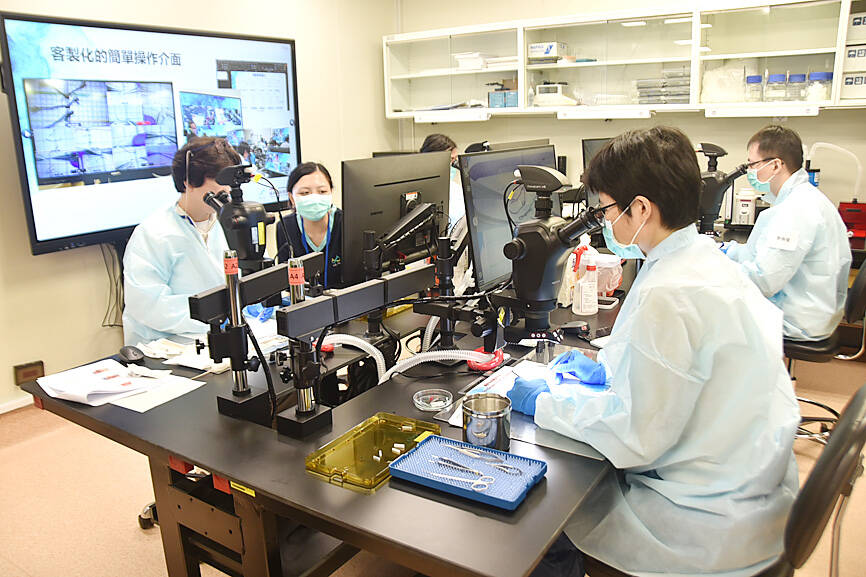The National Applied Research Laboratories (NARLabs) on Tuesday introduced a new interactive lab animal microsurgery education center, touting its ability to increase the post-surgery survival rate of lab animals to nearly 100 percent.
At a news conference, NARLabs president Tsai Hung-yin (蔡宏營) introduced the new facility, which was established in Taipei by the National Laboratory Animal Center (NLAC), as the first of its kind in the world.
Tsai said that researchers often simulate illness and diseases — such as strokes from vascular embolism — on small lab animals using microsurgeries to test new treatments and medications.

Photo: Wu Po-hsuan, Taipei Times
However, enhancing microsurgery skills and reducing the use of lab animals is a global trend the center seeks to follow, he said.
NLAC director-general Chin Hsian-jean (秦咸靜) said that the education center, which was opened in October last year, utilizes a hybrid teaching method that allows students to watch surgical operations on their individual devices on-site, from home or on streaming applications.
Such a method is different from the past, when a group of students had to crowd around the teacher to watch one screen showing the microsurgery, Chin said.
The new education center can accommodate 12 students, where the teacher can observe students’ operations and provide real-time guidance, she said.
The NLAC has developed bionic teaching aids, including models of skin and vessels, for beginners to practice on, thereby reducing the number of lab animals operated on, Chin said.
In the past, student microsurgeries resulted in a large number of lab animal deaths, with a survival rate below 80 percent, she said.
However, the new approach, after being carried out by trainees at the new center, has increased post-surgical survival rates to nearly 100 percent, Chin said.
The NLAC is considering applying to patent the bionic teaching aids, she added.
The education center also enhances animal welfare by employing an animal care system that incorporates anesthetization, monitoring and breeding systems, Chin said.
She expressed hope that the center would be able to provide preclinical testing for universities and pharmaceutical companies around the world.

SHIPS, TRAINS AND AUTOMOBILES: The ministry has announced changes to varied transportation industries taking effect soon, with a number of effects for passengers Beginning next month, the post office is canceling signature upon delivery and written inquiry services for international registered small packets in accordance with the new policy of the Universal Postal Union, the Ministry of Transportation and Communications said yesterday. The new policy does not apply to packets that are to be delivered to China, the ministry said. Senders of international registered small packets would receive a NT$10 rebate on postage if the packets are sent from Jan. 1 to March 31, it added. The ministry said that three other policies are also scheduled to take effect next month. International cruise ship operators

NUMBERS IMBALANCE: More than 4 million Taiwanese have visited China this year, while only about half a million Chinese have visited here Beijing has yet to respond to Taiwan’s requests for negotiation over matters related to the recovery of cross-strait tourism, the Tourism Administration said yesterday. Taiwan’s tourism authority issued the statement after Chinese-language daily the China Times reported yesterday that the government’s policy of banning group tours to China does not stop Taiwanese from visiting the country. As of October, more than 4.2 million had traveled to China this year, exceeding last year. Beijing estimated the number of Taiwanese tourists in China could reach 4.5 million this year. By contrast, only 500,000 Chinese tourists are expected in Taiwan, the report said. The report

Temperatures are forecast to drop steadily as a continental cold air mass moves across Taiwan, with some areas also likely to see heavy rainfall, the Central Weather Administration (CWA) said. From today through early tomorrow, a cold air mass would keep temperatures low across central and northern Taiwan, and the eastern half of Taiwan proper, with isolated brief showers forecast along Keelung’s north coast, Taipei and New Taipei City’s mountainous areas and eastern Taiwan, it said. Lows of 11°C to 15°C are forecast in central and northern Taiwan, Yilan County, and the outlying Kinmen and Lienchiang (Matsu) counties, and 14°C to 17°C

STEERING FAILURE: The first boat of its class is experiencing teething issues as it readies for acceptance by the navy, according to a recent story about rudder failure The Hai Kun (海鯤), the nation’s first locally built submarine, allegedly suffered a total failure of stern hydraulic systems during the second round of sea acceptance trials on June 26, and sailors were forced to manually operate the X-rudder to turn the submarine and return to port, news Web site Mirror Daily reported yesterday. The report said that tugboats following the Hai Kun assisted the submarine in avoiding collisions with other ships due to the X-rudder malfunctioning. At the time of the report, the submarine had completed its trials and was scheduled to begin diving and surfacing tests in shallow areas. The X-rudder,